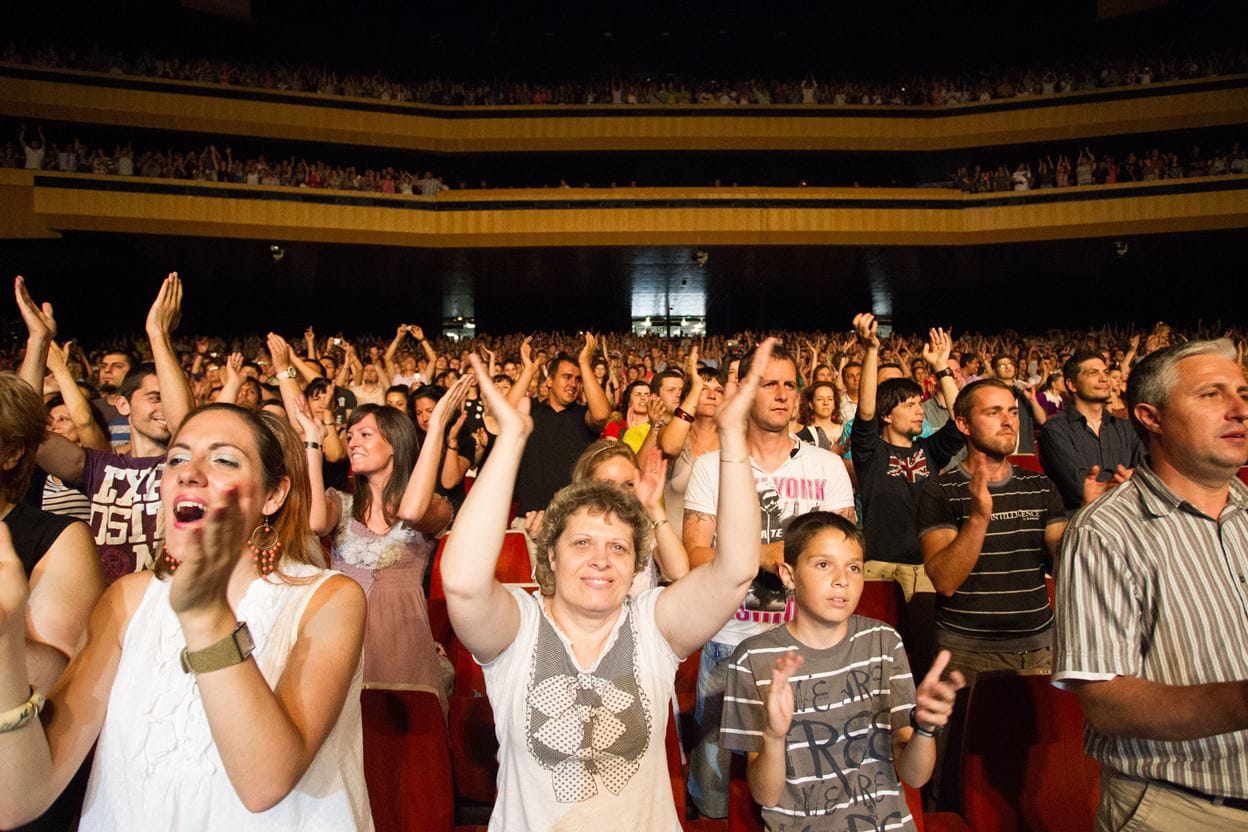Gypsies Bulgarians and the Gospel
Discover how Joyce Meyer’s conference brought hope and new freedom to a country still reeling from the effects of communism.

A trip to Eastern Europe reminded me that I could easily have been born under a communist regime and taught from the very beginning there is no god—and to desire one means you are weak, unpatriotic.
Eastern Europeans Struggle to Find Meaning
Like so many in this region, I might have put my faith in communistic ideals…that is until communism fell. Then I could have struggled, as many did, watching my empty life shatter around me.
Many people I spoke to in Eastern Europe, and Bulgaria in particular, shared how they felt their lives crumbled with the Berlin Wall. They felt confused and disillusioned, but eventually some began to experience a glimmer of something new…hope.
Remembering the People of Bulgaria
Missionary Jim Puhr came to the region just after the Iron Curtain fell—marking the end of communism. He says at that time many people came to share the Gospel, but over 20 years later this area is still neglected and many have yet to hear the truth of Christ. They feel forgotten.
"You walk down the streets of Sofia, Bulgaria, and the people all look fine. But these countries in Eastern Europe have some of the highest suicide rates in the world. So even though the people look fine, they've got turmoil inside," Puhr says.
So as a missionary and a partner with Joyce Meyer Ministries, Jim was overjoyed when he heard Joyce would be going there to minister to the people.
"It hasn't been done in this part of the world, especially in the last 10 or 15 years, and so it's like a new beginning for most of these churches…a new spark to the body of Christ in all these countries. It's like they are not forgotten," Puhr explains.
Thousands Receive Christ in Sofia, Bulgaria
The night of the conference, crowds filled the theater to overflowing as Joyce shared about a new hope in Christ and thousands answered the call to receive Jesus as Savior.
Joyce says she was thrilled with the response. "I set my mind a couple years ago to go to places where maybe other people weren't going and to minister to some of the people who didn't have [many ministers] come. We can go places where we could maybe get bigger crowds, but that doesn't mean that it will be more important."
Gypsies and Bulgarians Worshipping Together
One of the most beautiful sights of the Sofia meeting went perhaps unnoticed by outsiders, but the people of Bulgaria were very much aware. Sitting side-by-side were Bulgarians and Gypsies, a phenomenon that rarely happens.
Eleonora Popova, from The Truth and Life Foundation, explains, "Gypsies are one of the major ethnic groups in Bulgaria, second in number. They came here centuries ago, integrated into society until about 50 years ago when, under the communist regime, they were sent to ghettos.
"They were isolated in very poor living conditions in very small houses, often without electricity or running water. Even today, because of their isolation and the conditions they live in, they are facing major problems. Many of the Gypsies are not educated at all. As a result, they aren't able to find jobs and they live in tremendous poverty."
The unemployment rate for the Gypsy people is over 90 percent, and Popova says many resort to illegal activities to survive, from petty thievery to organized crime.
Popova says, "People all around Bulgaria are very afraid of Gypsies. If they see a Gypsy they will probably go on the opposite side of the street just to avoid meeting them because they are afraid."
But for a couple of hours at Sofia's National Palace of Culture, Gypsies and Bulgarians worshipped and were introduced to Christ together without fear. That evening was the beginning of life-long change for many people regardless of ethnicity.
Antonio Illiev, pastor of a Gypsy congregation in Sofia, says a truly amazing transformation happens when these people grasp how much God loves them. Their entire lives change.
"They just melt, they melt. Then they understand God created them and they're precious. They don't have to change into a different ethnicity. They can be something wonderful in their ethnic group," says Pastor Illiev.
Making It Possible to Spread the Gospel
Joyce is quick to point out that none of this could have happened without our partners who sent us to Bulgaria. "We're very excited about the opportunity to be here because these are people who don't have [the Gospel] on every corner and every television station they turn on. They don't have the resources available to them and they really, really need to be encouraged. And so we count it a privilege and an honor that God has allowed us to come in at this time."
With privilege comes responsibility. Thank you for recognizing yours and restoring hope together with us in Bulgaria and throughout Eastern Europe.






